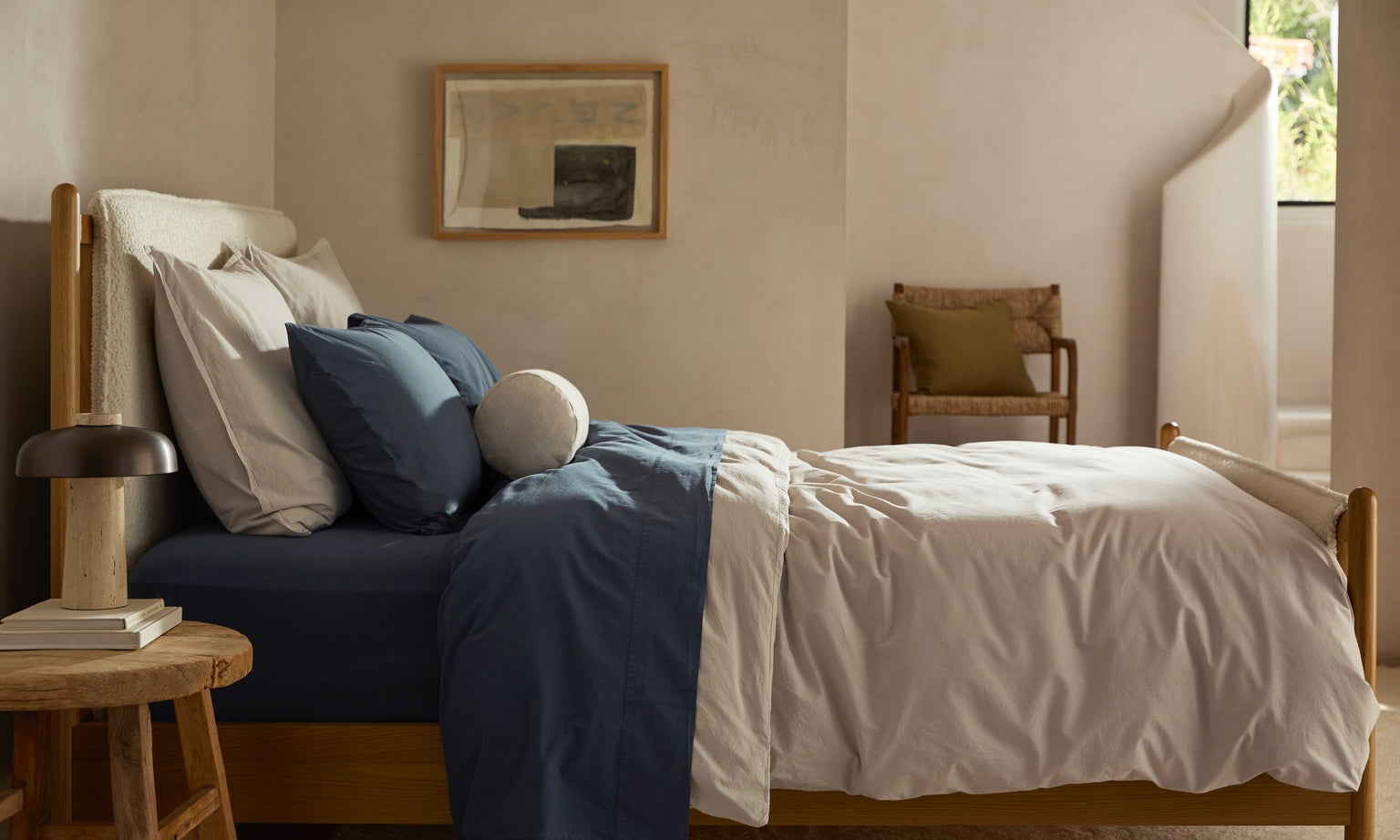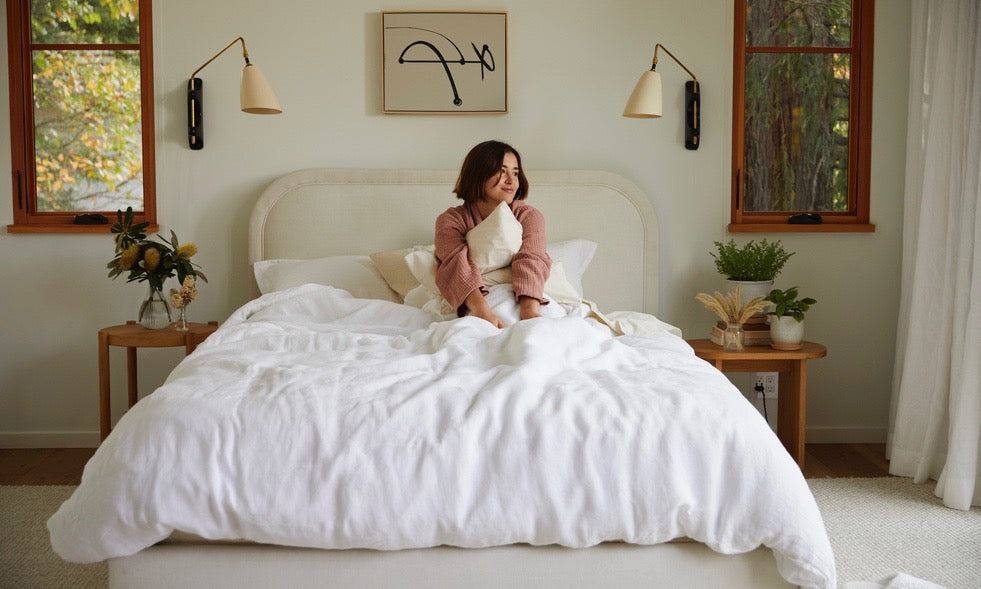
Declutter Your Bedroom for Better Sleep
Organization experts explain why bedroom disorder is hampering your sleep – and how to declutter for optimal rest.
If you’ve ever gone to bed feeling a little guilty about the condition of your bedroom, there’s a good chance that mess interfered with your sleep. “The last things we see (or think about) before sleep and the first things we see when we wake up influence our entire lives,” says the author of “Feng Shui for Dummies,” David Daniel Kennedy. Here, organization experts explain why bedroom disorder is hampering your sleep – and how to declutter for optimal rest.
How Physical Clutter Interferes with Sleep
When your bedroom is filled with clutter it will “weigh” on you consciously or unconsciously, according to Christa O’Leary, author of “Home in Harmony.” This can prevent you from fully recharging overnight. “If you wake up and are immediately depleted by your surroundings, it will impact your well-being as you move through the rest of your day,” she explains. “Your bed and bedroom should be a sanctuary where you’re able to rejuvenate your mind, body and spirit.”
When your brain is surrounded by clutter, it interprets that hodgepodge as a task that needs to be completed. “We might eventually ignore the clutter on a conscious level because it’s been there for so long, but on an unconscious level the brain wants to complete the task,” Christa declares. These surroundings can make us feel distracted, down or anxious whether we’re aware of it or not.
Removing the chaos of clutter not only gives your unconscious full capacity to relax and release tension, but it can also help you connect better with your partner. “The purpose of the bedroom is for rest and relating with your partner. Anything we add on top of that can easily zap the strength and quality of those two precious things in our life,” David says.
Beware These Items That can Interfere with Rest
Tech Devices
If you can eliminate anything with a screen from your bedroom, you’ll be more likely to feel at peace. We’re so connected to devices throughout our day that they make the mind extremely busy. Tablets, smart phones and computer screens emit blue light which activates our brains and makes it difficult to fall asleep after looking at them, according to recent research.
Business Documents
Create a boundary from your work life. Seeing bills, to-do lists and papers you have to deal with can distract from sleep.
Bookshelves Full of Books
Each book represents ideas – content you’ve already read or a pull toward something you haven’t read but feel you should have – all of which can occupy your mind before falling asleep.
Stimulating Colors and Artwork
Any art that’s exciting, fantastic and intense to look at can get your mind going rather than help you calm down. Choose art with soothing, soft colors and peaceful scenes.
Family and Friends Photographs
If looking at those photos makes you feel calm and peaceful, then keep them. But if you have issues and irritations with those people, then remove their images from your bedroom.
Messy Spaces
While we can’t keep our bedrooms perfectly neat and tidy all the time, if you have dirty clothes laying around, laundry to put away or clutter on the floor, you’ll focus on the chaos instead of your dreamy, blush linen bedding. Not the best way to start your day. Keep the floor and surfaces as clear as possible so your room remains a haven of relaxation, not a place of disorder and stress.
Large Furniture
“One of the biggest issues I have with clients’ bedrooms are large pieces of furniture,” shares David. “If you have a big armoire by the bed, you subconsciously might be afraid it will fall on you. Keep the room simple to make space for calm energy.”
Storage Under the Bed
In feng shui it’s recommended to keep the space under the bed clear to make room for energy to circulate. “When things are crammed together in a closet, loaded up in drawers or piled high under a bed…you aren’t able to find things you need easily which can leave you exasperated,” says Christa. Clear your space to include only items you truly love.
Light Clutter
Switch to softer lighting the last 30 to 60 minutes before sleep. Flickering lights are soothing and relaxing to the mind. Get the darkest curtains possible to help you sleep better and block outside light from keeping you awake.
Noise Clutter
The ideal sleeping environment is dark and quiet. If outside sounds are blaring into your bedroom, you may need to modify your windows or hang a heavy drape. If electronics are buzzing and heaters are turning on and off all night, consider getting a sound machine or a fan for white noise.
Some Helpful Tips for Decluttering
Put a Plan in Place
Break the big job into manageable steps and assign dates for each task to be completed.
Enlist Help
Have a friend come over and give you a hand, or, if it’s intense and severe, enlist a professional organizer. Get snacks and make a party out of the task!
Make Piles
Create piles of stuff you can donate, stuff you can give to a friend and stuff you should toss.
Break Up Daily Tasks into Chunks
Do a healthy amount of clearing, then take a break and come back to it. Reward yourself when you’ve completed your goals with an activity that brings you joy. “Acknowledging and celebrating each small [task] motivates you to move forward and continue the process,” Christa advises.
Ged Rid of the Big Stuff
If you can get rid of large pieces of furniture first, that’ll create more space for you to work in.
Send Bags Away That Day
Try to physically get as many bags of items you’re getting rid of offsite that day. You’ll immediately feel better having more space in your bedroom and getting rid of some clutter.



